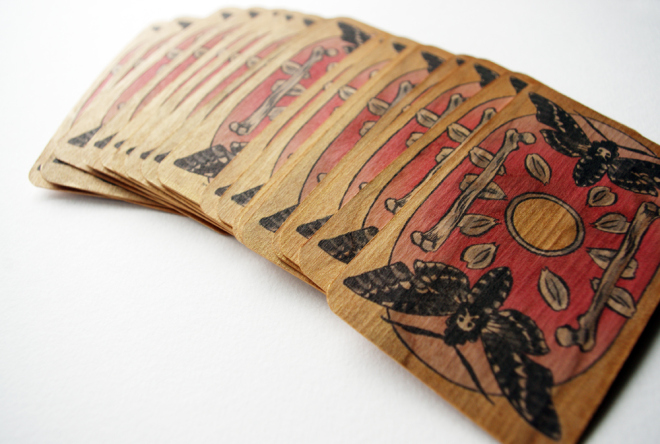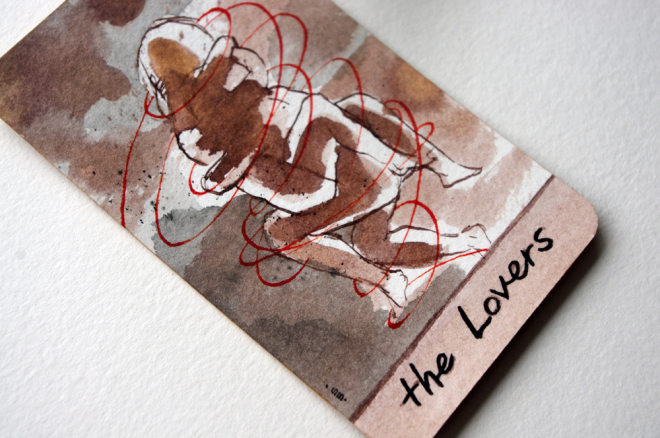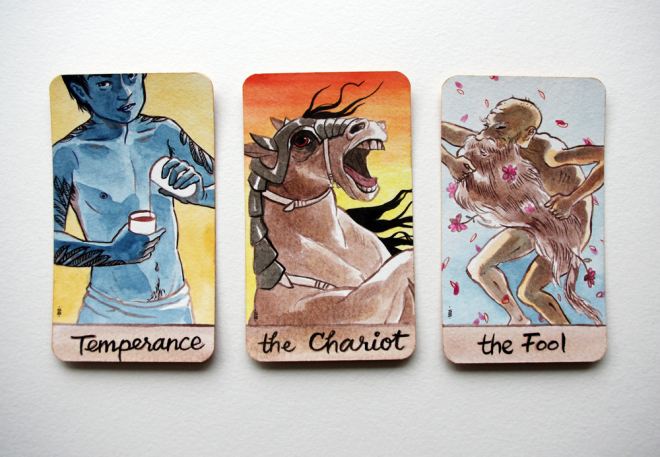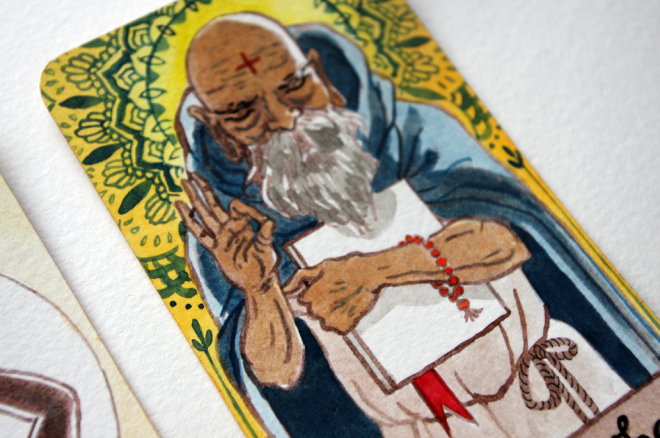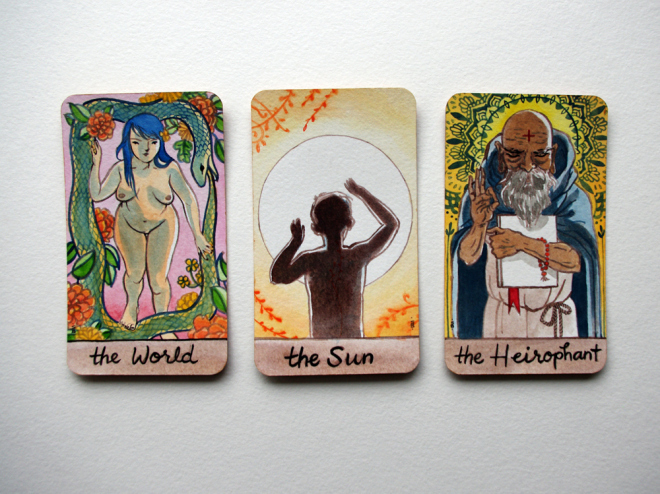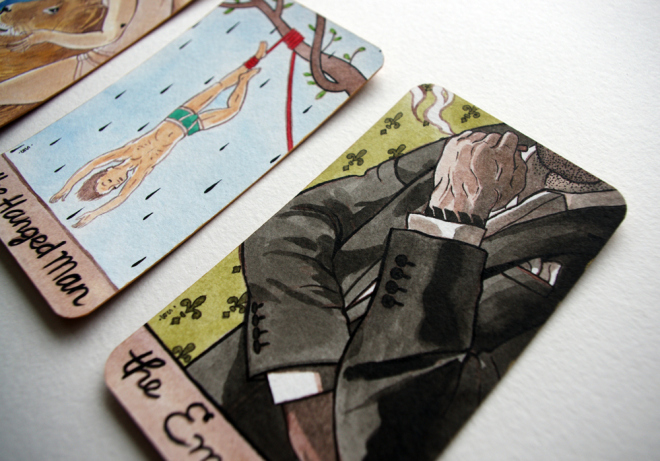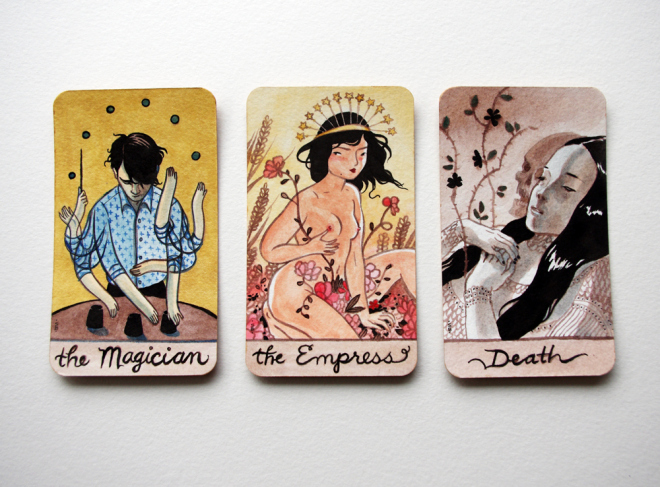What follows is a variation on the trick Windows by Andy Nyman. That trick involves people thinking of a memory associated with an emotion and you naming that emotion. I found that some people find this trick a little too believable, (“I thought of a happy memory and you were able to tell I was thinking of a happy memory… so what?")
So this is a variation I’ve used on the premise with people I suspect might have that reaction.
The emotions used come from here.
Opia
Effect: Your spectator chooses a card with the definition of an obscure emotion on it. They concentrate on the emotion and form a picture of it in their mind. You're able to tell them the emotion they're feeling a describe parts of the picture as well.
Method: Get 10 index cards and write one of the following words and definitions on each card. Write out the cards so the word in italics in each definition is at the end of the first line on each card (don't actually write it in italics, of course).
lachesism
n. the desire to be struck by disaster—to survive a plane crash, to lose everything in a fire,
to plunge over a waterfall—which would put a kink in the smooth arc of your life, and forge it into something hardened and flexible and sharp, not just a stiff prefabricated beam that barely covers the gap between one end of your life and the other.
Rückkehrunruhe
n. the feeling of returning home after an immersive trip only to find it fading rapidly from your awareness—to the extent you have to keep reminding yourself that it happened at all, even though it felt so vivid just days ago—which makes you wish you could smoothly cross-dissolve back into everyday life, or just hold the shutter open indefinitely and let one scene become superimposed on the next, so all your days would run together and you’d never have to call cut.
chrysalism
n. the amniotic tranquility of being indoors during a thunderstorm, listening to waves of rain pattering against the roof like an argument upstairs, whose muffled words are unintelligible but whose crackling release of built-up tension you understand perfectly.
opia
n. the ambiguous intensity of looking someone in the eye, which can feel simultaneously invasive and vulnerable—their pupils glittering, bottomless and opaque—as if you were peering through a hole in the door of a house, able to tell that there’s someone standing there, but unable to tell if you’re looking in or looking out.
kenopsia
n. the eerie, forlorn atmosphere of a place that’s usually bustling with people but is now abandoned and quiet—a school hallway in the evening, an unlit office on a weekend, vacant fairgrounds—an emotional afterimage that makes it seem not just empty but hyper-empty, with a total population in the negative, who are so conspicuously absent they glow like neon signs.
vemödalen
n. the frustration of photographing something amazing when thousands of identical photos already exist—the same sunset, the same waterfall, the same curve of a hip, the same closeup of an eye—which can turn a unique subject into something hollow and pulpy and cheap, like a mass-produced piece of furniture you happen to have assembled yourself.
mal de coucou
n. a phenomenon in which you have an active social life but very few close friends—people who you can trust, who you can be yourself with, who can help flush out the weird psychological toxins that tend to accumulate over time—which is a form of acute social malnutrition in which even if you devour an entire buffet of chitchat, you’ll still feel pangs of hunger.
vellichor
n. the strange wistfulness of used bookstores, which are somehow infused with the passage of time—filled with thousands of old books you’ll never have time to read, each of which is itself locked in its own era, bound and dated and papered over like an old room the author abandoned years ago, a hidden annex littered with thoughts left just as they were on the day they were captured.
kairosclerosis
n. the moment you realize that you’re currently happy—consciously trying to savor the feeling—which prompts your intellect to identify it, pick it apart and put it in context, where it will slowly dissolve until it’s little more than an aftertaste.
liberosis
n. the desire to care less about things—to loosen your grip on your life, to stop glancing behind you every few steps, afraid that someone will snatch it from you before you reach the end zone—rather to hold your life loosely and playfully, like a volleyball, keeping it in the air, with only quick fleeting interventions, bouncing freely in the hands of trusted friends, always in play.
Bring out the stack of index cards and give them to your spectator to flip through and read some of the definitions. Tell them these are new words you're trying to learn for obscure emotions. People will be interested in them. If they're not, they're probably not right for this trick.
Do a Charlier shuffle to supposedly mix the cards. You could, if you want, just force one of the cards on someone and then have them feel that emotion and you could look in their eyes and read that emotion in them.
Or, with some memory work, you can give someone a free selection, cut the cards at the selection, peek the bottom card, and then know which one they are thinking of. Here's how you do that. It may seem like a lot of work, but it took me less than 15 minutes and I'm not good with memory stuff.
First, you need to know a rhyming peg system.
1 - gun
2 - shoe
3 - tree
4 - door
5 - hive
6 - bricks
7 - heaven
8 - weight
9 - wine
10 - hen
If it takes you more than two minutes to memorize that, you have a tumor or something.
Second you need to familiarize yourself, generally, with the definitions on the cards.
Now you are going to associate each peg word with the italicized word on the card, and a general concept of what that definition is about. So let's go through them.
1 - gun - fire - Guns fire. Being shot would be you suffering a personal tragedy. The first word is about wanting to struck by a disaster.
2 - shoe - trip - You trip over your shoes. Taking a trip. The second word is about taking a trip and having it fade from your memory.
3 - tree - thunderstorm - Picture a tree struck by lightning in a thunderstorm. The third word is about the comfort of being inside during a thunderstorm.
4 - door - eye - Eyes are the doorway to the soul (yes, they usually say window, but google it, they say doorway to the soul too.) The fourth word is about looking someone in the eye and that being an intrusive and vulnerable position to be in at the same time.
5 - hive - bustling - Bustling/buzzling. Buzz, bees, hive. Think of all of the bees in the hive, then picture an empty hive. The fifth word is about the eerie feeling of being in an empty place that is usually filled with people.
6 - bricks - photos - Think of taking a picture with a brick for a camera. How futile that would be. The sixth word is about the futile feeling of taking a picture of something that has already been photographed 1000s of times before.
7 - heaven - life - Heaven comes after life. Social life. The seventh word is about having an active social life but very few close friends. (A common cold reading concept.)
8 - weight - bookstore - Think of books being used to weigh something down. The eighth word is about the wistfulness of old bookstores.
9 - wine - happy - Wine makes you happy (you lush). The ninth word is about being happy and recognizing you're happy in the moment and dissecting your happiness and making yourself unhappy because of it.
10 - hen - loosen your grip - Imagine you hold a bird in your hand. You loosen your grip to let it fly away. It's a hen, it doesn't fly, it just falls out of your hand. The tenth word is about the desire to let go of things and care less about them.
So, let's go back. You do a Charlier shuffle. You allow someone to cut the cards and take the top card. You tell them to read that card over and to embrace the feeling it describes and maybe picture a scenario they can imagine feeling it in. As they read you peek your keyword which is the last word in the first row of the definition of the card on the bottom. Toss the rest of the cards over to the person as well.
Now you have some time to do your mental gymnastics. You peeked the word "trip." You trip over your shoes. Shoe = 2. That means she has the next card, card three. Three = tree. You imagine a tree struck by lightning in a thunderstorm. She's thinking of the word that means taking comfort indoors during a thunderstorm. You ask her to close her eyes and let this feeling wash over her then ask her to open her eyes and look directly in yours. You stare deep into her eyes.
"I feel a sense of... contentment or calmness... I think. But there's something else going on too. Are you picturing yourself in a certain place? You're in your home, right? In bed or on the couch or something? There's something else going on though... oh, I know. The thunderstorm one, yes? You are feeling the comfort of being inside during a thunderstorm."
Most of these words will give you a little more to talk about than if you're just guessing a standard emotion. You can usually picture the type of place they're in physically where they might be feeling this. And a lot of these feelings are multilayered, which is a nice thing to be able to pick up on if you claim to really be absorbing the emotion coming from them. Whereas if someone is just thinking of "happy" that's really a kind of straightforward emotion.
Another nice thing is if they pick "opia" you can say, "You're not just imagining this feeling, you're actually feeling it right now." Which is kind of an interesting moment where they are genuinely feeling the emotion they're supposed to be thinking of.
Don't bother learning the words themselves. The fact that you don't know the actual words just reinforces the notion of you picking up on the feeling itself, rather than you having peeked the word somehow.
As to why you have the cards in the first place, you can make the point that reading more obvious emotions like sadness and happiness is less of a challenge because that's something we're trained to do since the time we're children. So you're trying to learn to read these more subtle emotions.
Like most of the effects I describe here, it's probably best used in a casual, informal setting (although, depending on the audience, there are probably other places to use it as well). Unlike Nyman's great trick, this isn't a simple, impromptu effect, which is its main drawback. But if you make up this set of cards, you'll have an interesting and rich effect that can easily lead to some deep and engaging conversations. (And without the possibility of someone having to stir up emotions related to a botched circumcision, a favorite aunt being trampled by a marching band, or some other legitimately painful memory.)















